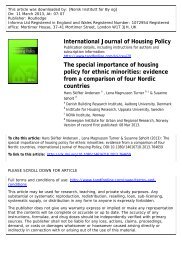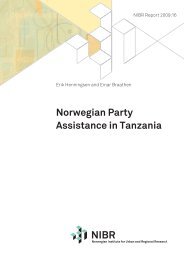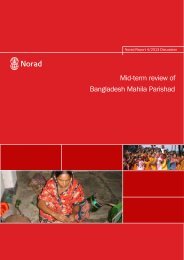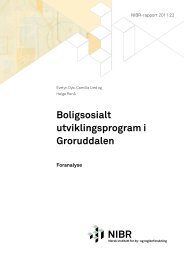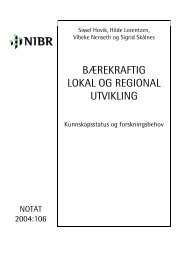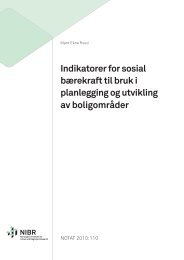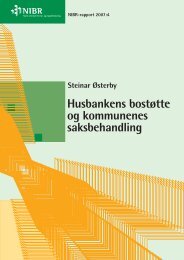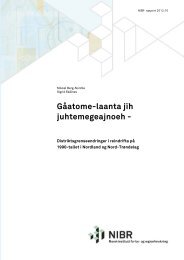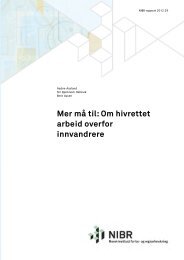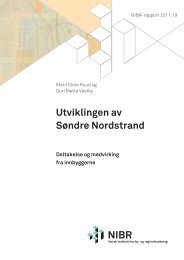Barns behov eller foreldres særinteresser - Norsk institutt for by- og ...
Barns behov eller foreldres særinteresser - Norsk institutt for by- og ...
Barns behov eller foreldres særinteresser - Norsk institutt for by- og ...
Create successful ePaper yourself
Turn your PDF publications into a flip-book with our unique Google optimized e-Paper software.
10<br />
important questions like segregation and creaming. But it is possible<br />
to indicate some tendencies.<br />
According to motives it is not surprising that what seems to be the<br />
most important motive is the school profile on either religion or<br />
education. Thereafter parents are concerned that schools, which their<br />
children attend are characterized with a positive sense of value. The<br />
meaning of value parents hold, are to infuse human interaction<br />
between adults and children as well as between the children at<br />
schools. The next important motive parents hold is what they<br />
understand to be their children’s needs. Needs includes the school<br />
environment and milieu and what parents understand to be a good<br />
milieu <strong>for</strong> learning. Some children have a health problem and parents<br />
are concerned about that. Some parents have an experience with their<br />
children being bullied and mocked at the public school they attended<br />
previously, other parents expects such thing to happen in public<br />
schools in contrast to private schools. That they assume private<br />
schools to be safer than public schools motivate their choice. With<br />
learning milieu parents think of diverse things such as intellectual<br />
challenges, adjusted learning, no marks, smaller schools and classes,<br />
and possibilities <strong>for</strong> undisturbed work.<br />
The meanings parents hold on the unitary school system also<br />
motivates them when it comes to school choice. They may support the<br />
<strong>for</strong>m of the unitary school system which implies that all children with<br />
different socioeconomic and ethnic background are supposed to attend<br />
the same neighbourhood school. Thus, they do not support its<br />
objective that these children are also supposed to learn the same things<br />
similarly. They are not motivated <strong>by</strong> what they think is a badly<br />
supported public school, but partly <strong>by</strong> what they think are schools and<br />
classes that are too big. Parents are also motivated <strong>by</strong> having made<br />
negative experiences with the unitary school system. Discontentment<br />
is experienced both with municipal school administration and with<br />
single schools. Parents are not motivated from wanting to have an<br />
influence on the education which their children receive. They do,<br />
however, experience influence on schooldays and school management.<br />
This influence they take into use and they involve themselves in<br />
the schools of their children. They also experience teachers and school<br />
leaders to be responsive. The responsiveness empowers parents in<br />
their choice.<br />
Parents are neither motivated <strong>by</strong> the thought of having a more<br />
practical daily life, nor <strong>by</strong> wanting to signal social belonging to a<br />
special group of people. Parents hold that the in<strong>for</strong>mation they get is<br />
NIBR-rapport 2003:8



